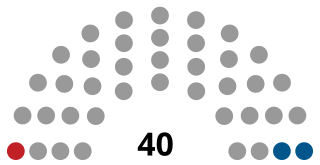
The National Assembly is bicameral with the lower house, the Chamber of Deputies, having 40 members elected in single-seat constituencies for a four-year term. The upper house, the Shura Council, has 40 members appointed by the King of Bahrain, with the stated aim of giving a voice to minority communities and technocratic experts within the legislative process. Supporters of the system refer to long established democracies the United Kingdom and Canada operating with this bicameralism with an appointed upper chamber and an elected lower chamber. Opponents of this system point out that unlike the bicameral systems in the UK and Canada, the Bahraini system gives the unelected upper house equal or more legislative power than the elected lower house, allowing the King to control all legislation. Opponents also point out that the current system was imposed unilaterally by the King, violating the 1973 Constitution and a 2001 signed agreement with the Bahraini opposition.

Islam is the state religion in Bahrain. Due to an influx of immigrants and guest workers from non-Muslim countries, such as India, the Philippines and Sri Lanka, the overall percentage of Muslims in the country has declined since the late 20th century. Bahrain's 2010 census indicated that 90.2% of the population is Muslim. The last official census to include sectarian identification reported 83% as Shia of the Muslim population.
The National Democratic Action Society - Wa'ad is Bahrain's largest leftist political party.

Al-Wefaq National Islamic Society, or Al-Wefaq for short, is a Bahraini political party. Although from 2006 to 2011 it was by far the single largest party in the Bahraini legislature, with 18 representatives in the 40-member Bahraini parliament, it was often outvoted by coalition blocs of opposition Sunni parties and independent MPs reflecting gerrymandering of electoral districts. On 27 February 2011, the 18 Al-Wefaq members of parliament submitted letters of resignation to protest regime violence against pro-reform Bahraini protestors.
Ali Salman Ahmed Salman is a Bahraini Twelver Shi'a cleric and the Secretary-General of the Al-Wefaq political society. In January 1995 the Bahraini government forcibly exiled him to Dubai for leading a popular campaign demanding the reinstatement of the constitution and the restoration of parliament during the 1990s Uprising. From there he made his way to London and sought asylum. He continued opposition activities from London, where he was associated with the Bahrain Freedom Movement. Salman returned to Bahrain in March 2001 in a general amnesty as part of a set of political reforms announced by King Hamad.
Al Meethaq, or the 'National Action Charter Society', is a liberal political party in Bahrain. It was founded by Sunni and Shia businessmen from well-known families in 2002.

Women's rights have been a cornerstone of the political reforms initiated by King Hamad, with women gaining the right to vote and stand as candidates in national elections for the first time after the constitution was amended in 2002. The extension of equal political rights has been accompanied by a conscious drive to promote women to positions of authority within government.
Sheikh Adel Al Mouwda was the second deputy chairman of Bahrain's parliament of 2002, the Chamber of Deputies, and the former leader of salafist party, Asalah. Sheikh Al Mouwda is considered the leading spokesman for political Islam in Bahrain and is known for his forthright views, which has seen him often quoted in the international press.

The National Justice Movement, also known as the Al Adala Society, is a secular nationalist political party in Bahrain.
Munira Fakhro is a Bahraini academic and was a candidate in Bahrain's 2006 general election for the opposition Waad.

Women candidates of the 2006 Bahrain election, which took place on the November 25, 2006 were reported to have received numerous threats from Islamic salafist and other factions to prevent them taking part. In all, eighteen female candidates of various political stances and views took part after recent changes to the political system in 2001 allowed women to not only become candidates, but also gave them the right to vote.

Al Menbar National Islamic Society is the political wing of the Al Eslah Society in Bahrain. A Sunni Islamic party, it is well organised through a network of mosques and seek to promote a conservative social agenda while not directly challenging the Kingdom's government. It become political society in 2006. Bahrain doesn't allow political parties by traditional definition. Before that it was merely a think tank and public affair society. Al Menbar won one seat in Bahrain's 2014 general election, down from two seats in 2010.

General elections were held in Bahrain on 25 November 2006 for the 40-seat Council of Representatives alongside municipal elections. There was a 72% turnout in the first round of polling. As expected by most observers, Shi'a and Sunni Islamists dominated the poll, winning a clean sweep in the first round of voting, while liberal and ex-communist MPs lost all their seats. Four candidates of the left-wing National Democratic Action made it through to second round run-off which was held on 2 December 2006.
The Al Asalah Islamic Society is the main Salafist political party in Bahrain, with four MPs after 2006's general election.
In the 2000s in Bahrain the government instituted political reforms and relaxed economic controls.

General elections were held in Bahrain with the first-round on 23 October 2010, and the second round on 30 October. Al-Wefaq won a plurality. The election followed controversy amidst boycotts and arrests.

General elections were held in Bahrain on 24 October 2002. They were the second general elections in the country's history, and the first since the dissolution of the National Assembly elected in 1973. The elections were also the first to be held under the 2002 Constitution, with voter turnout reported to be 53.2%.
Mohamed Yousif Rashid Albuflasa is a Bahraini poet, writer, former independent candidate for the Bahraini Parliament in the 2010 Parliamentary elections and a member of the Bahraini youth parliament. He belongs to the Albuflasa Bedouin clan. Formerly a Bahrain Defence Force officer, he is now employed at the court of Crown Prince Salman bin Hamad bin Isa Al Khalifa.












